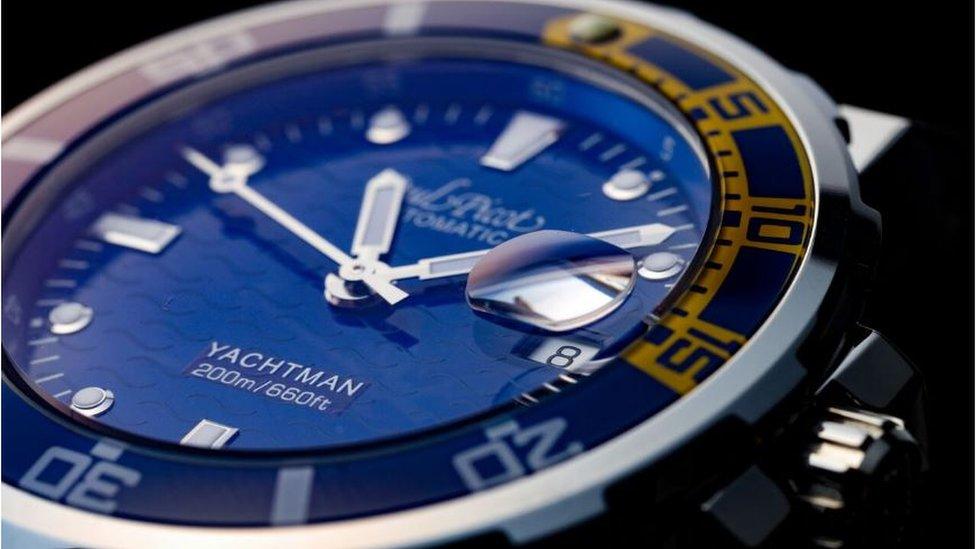Baselworld: Swiss watchmakers smarten up their act
- Published
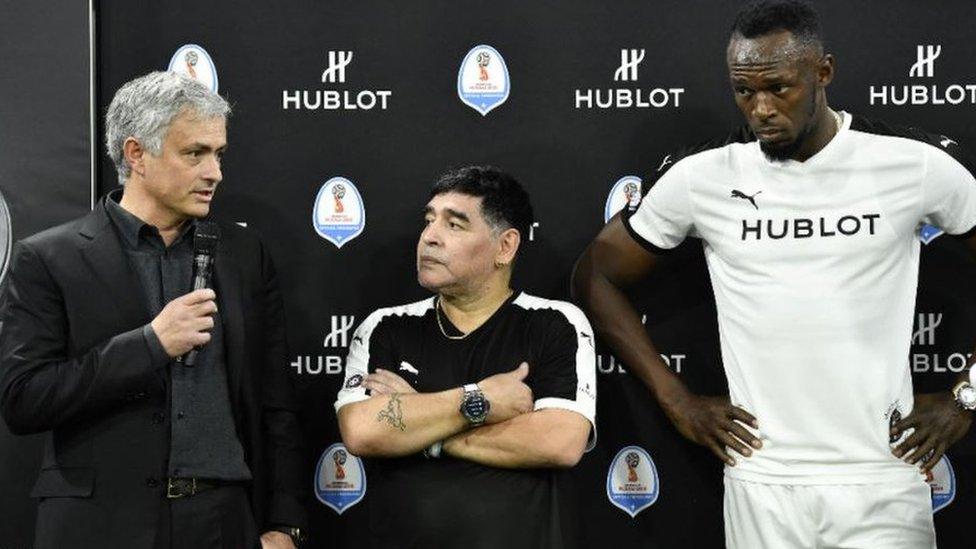
Jose Mourinho, Diego Maradona and Usain Bolt at the Hublot press conference
Luxury watch label Hublot must have spent a small fortune bringing together football royalty - and soccer-mad Usain Bolt - for the launch of a new product.
They were joined by other legends from South America and Europe to add some sporting glitter to the unveiling of Hublot's first smartwatch, which coincides with the brand's sponsorship of this summer's World Cup.
The unveiling at Baselworld, the huge annual watch jamboree in the Swiss city of Basel, was the biggest celebrity event of the show.
That it was for the launch of a smartwatch was also significant. Because this looks like being the year when mainstream Swiss watchmakers accepted that smart devices will be a big part of the wrist-wearing future.
Some Swiss manufacturers have been making smartwatches for years, but in general the industry has been a slow adopter of the technology.
The products being launched at Baselworld, though, are not the traditional black-faced Apple watch design. They are hybrid devices, mixing traditional features with connectivity.
And whereas they were until now all powered by quartz battery technology, Frederique Constant has gone one better with what it claims is the world's first smartwatch with a mechanical movement.
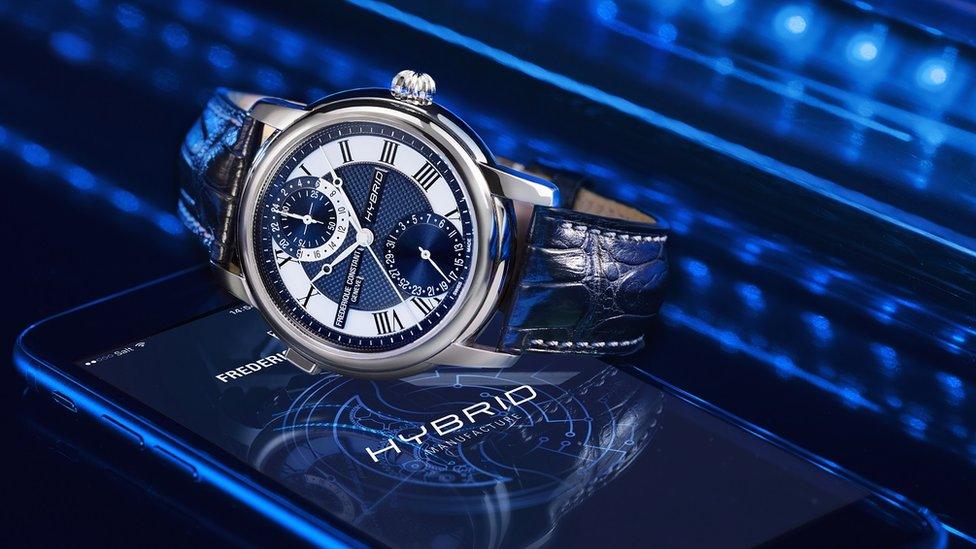
Frederique Constant's new hybrid watch
In other words, the watch is powered by a spring, not a battery.
Many critics of hybrid watches find them a turn-off because the analogue part of the movement - the heart of the watch that makes it work - was quartz.
Frederique Constant's president, Peter Stas, did not hold back on the significance of the company's new Hybrid Manufacture watch. "It could be a revolution" for the industry, he says.
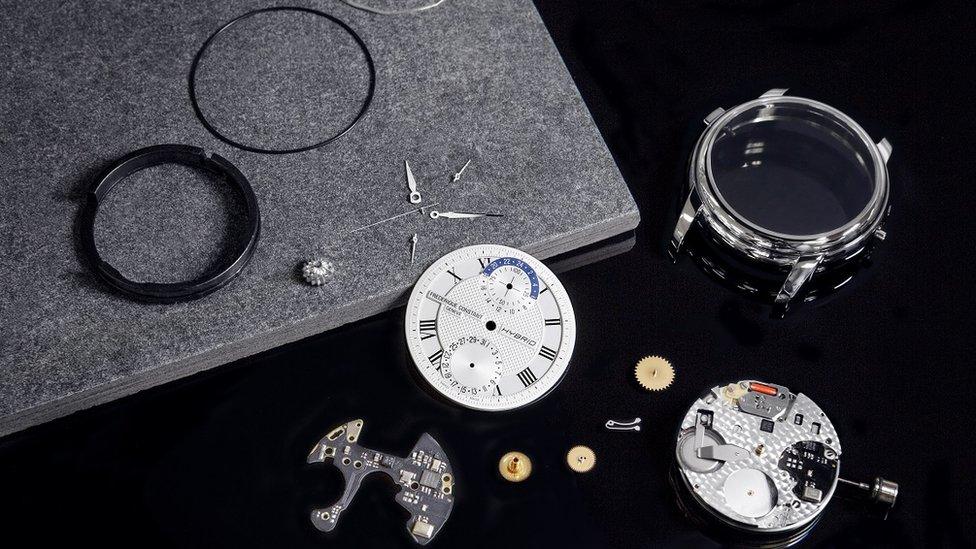
Frederique Constant's hybrid watch took two years to develop
Priced at up to $3,800 it's not cheap, but the watch is aimed at traditional - and wealthy - lovers of luxury timepieces who are interested in also owning a connected product.
The Frederique Constant group also unveiled other smart devices at Baselworld, including the Alpina X, which is aimed at the outdoor sporty type. It has a UV sensor, another first, says Mr Stas.
And to prove the company is at the forefront of the digital game, the watch is being launched with a Kickstarter fund-raising campaign.
This is aimed at getting feedback from what will almost certainly be a younger consumer on the best features and refinements for future developments.
The Kickstarter move underlines a problem facing traditional watchmakers, particularly in Switzerland where most of the major global brands reside.
Sales among younger consumers are falling, with buyers either turning to smart devices or shunning watches entirely.
Apple sold 20 million smartwatches last year, about the same number exported by the entire Swiss watchmaking industry.
"Smartwatches are not going away; Apple is not going away," says Mr Stas. But he doesn't want to overstate the Apple threat.
"Hybrid devices are in many ways opening up a whole new market. They are for people who want traditional design plus something that is connected," he says.
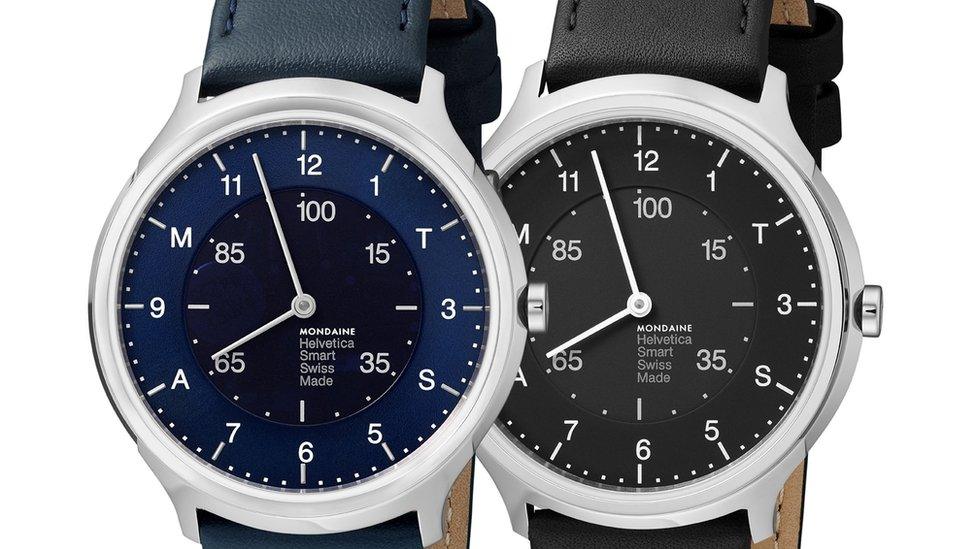
Mondaine launched new smartwatches at Baselworld
It's possible Apple could one day consider a hybrid design, although Mr Stas thinks this highly unlikely. "Apple is moving in a different direction. The DNA is different."
Mondaine Watch also unveiled a smart range this week. However, chairman Andre Bernheim can't see smart devices overtaking sales of traditional watches any time soon.
"But the time is here when most of the manufacturers will have to have them as part of the product range," he says.
He also doesn't see a threat from Silicon Valley or Samsung.
"A watch with a traditional design evokes an emotion. Lovers of good watches are passionate about them. You don't throw away a good watch, even if it's broken," Mr Bernheim says. The marketing challenge for hybrid manufacturers is to convince buyers they are not just a gadget
The emotional link is exactly why traditionalists are sceptical about smartwatches. "For me, it remains a fad; a fashion I think will change," one small watchmaker told the BBC.
The country's famous watch and clock heritage is not just used as a marketing tool. There are still scores of artisans hand-crafting pieces prized by collectors and enthusiasts.
Nevertheless, for the president of the Federation of Swiss Watchmakers, Jean-Daniel Pasche, says it is important that the label "Swiss Made" becomes a hallmark of quality smartwatches as well as traditional pieces.
He says: "We cannot say that smartwatches have affected our market. It has created a new market and both can develop alongside each other. It is important that the Swiss industry is a part of that."
And although the traditionalists extol the artisanal qualities of Swiss watches, Mr Stas is quick to point out the smartwatch is a far from uncomplicated piece of machinery.
Adding connectivity into an already cramped space has taken years of R&D at Frederique Constant.
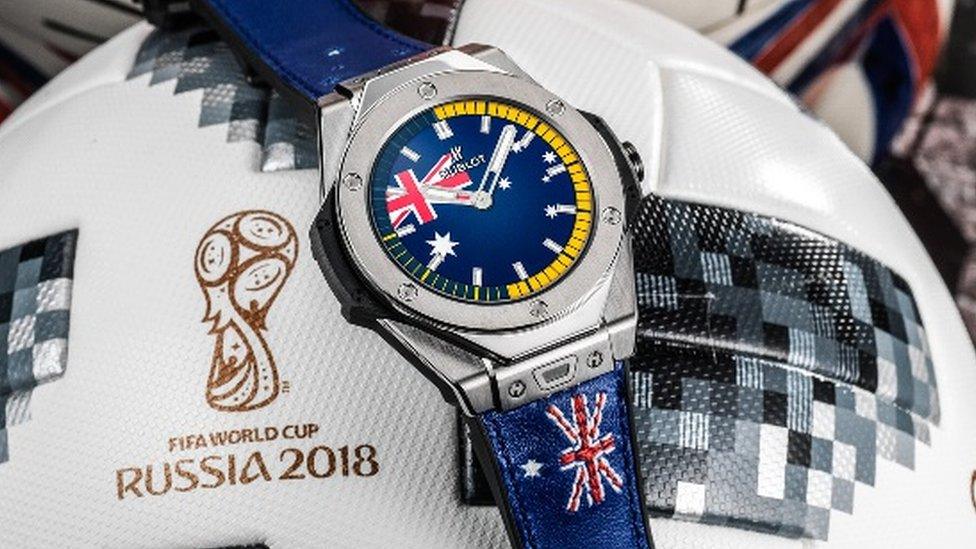
Hublot's first smartwatch can change flags according to which World Cup team a buyer supports
The movement and electronic parts are all made in-house at the company's factory in Geneva. The shield that protects batteries in the company's quartz smartwatches from magnetic interference is patented.
That Swiss manufacturers finally see the technology as part of the mainstream was underlined with the official launch of the first smart device by the luxury brand Hublot, part of France's LVMH group.
No expense seems to have been spared to promote Hublot's Big Bang Referee 2018 Fifa World Cup Russia watch (yes, that really is the name) as global football stars of the past were brought together to launch a watch that will have a limited run of 2,018 pieces with a price tag of about $5,800.
But it was a statement of intent from Hublot. The technology-packed watch, designed with Google and Intel, will be on the wrists of referees at this summer's World Cup.
Crucially for referees, the watch will be linked to new goal-line technology. But users will have pre-match alerts, goal alerts, and up to the second information on such things as red cards and player changes, as well, of course, as standard smartwatch features.
For a country whose watchmaking heritage goes back centuries, it looks like the industry is entering a new era.
- Published21 March 2018
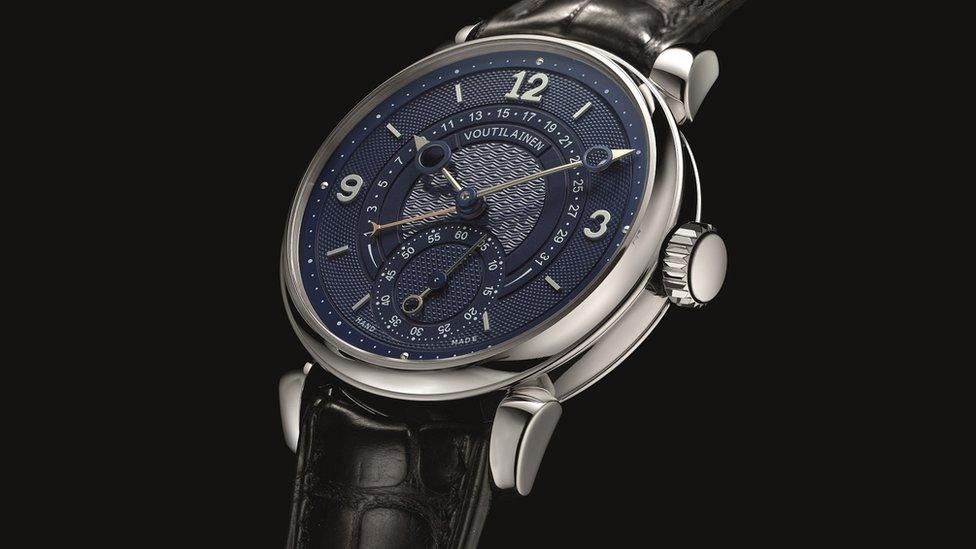
- Published20 March 2018
